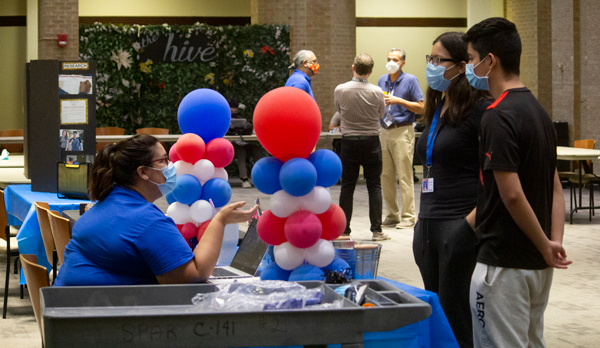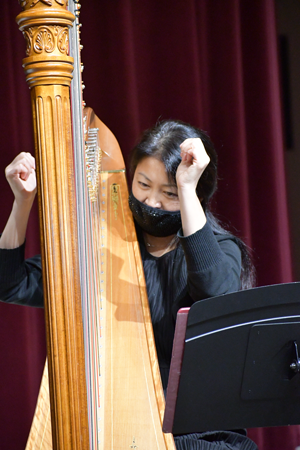Clubs, classes impacted by pandemic, one college

Lauren Anderson, Eastfield’s Student Engagement coordinator, speaks with students at the Sept. 15 Club Fair. Only six clubs attended. Many clubs have not returned after the year-long pandemic closure. Photo by Rory Moore/The Et Cetera
October 12, 2021
When Samanta Chirinos showed up for her first day of Eastfield choir this semester, the room was empty. Puzzled, the incoming freshman emailed her professor and was told that class had been canceled due to low enrollment.
Music theory, another class the music major had signed up for, was also canceled this semester.
“I was expecting those classes,” Chirinos said. “I was just excited to go to school to take those classes, and it was like a piece of me has been taken away.”
Choir is being offered at Brookhaven and Richland and music theory at Richland and North Lake, but Chirinos lives 15 minutes from Eastfield.
She doesn’t have transportation that allows her to take classes on other campuses.
Melinda Imthurn, choir director and music faculty, said COVID-19 was hard enough on Eastfield’s music programs, and the cancelations of key classes have only complicated matters for students.
Imthurn said due to the cancelations, there were students who couldn’t start their music field of study this semester and students who couldn’t finish.
“I encouraged the administration to go ahead and let the [choir] class make,” Imthurn said. “It would be really hard to build from nothing. But they canceled the class. So it’s going to be probably hard to rebuild. I’m committed to rebuilding it, but it’s going to take some time.”
[READ MORE: Class cancelations cause last-minute scramble]
Hazel Behning, a freshman and music major from Mesquite, opted to take music theory at Richland. The Spanish class she had been planning to take at Eastfield was also canceled, and the only option that would work for her schedule was an 8 a.m. Spanish class, also at Richland.
Every Monday and Wednesday morning, Behning leaves her house in Mesquite at 7 a.m. After fighting heavy traffic and passing through three school zones, she arrives at Richland, hopefully by 8 a.m.
Under normal traffic conditions the drive would only be 30 minutes, but during Dallas rush hour, it can be an hour or more.
Once Behning forgot her laptop and had to go back home for it, almost causing her to be late for music theory, which begins at 9:30 a.m. When that class finishes at 11 a.m., she gets back in her car and heads to Eastfield for more classes.
“On Wednesdays, I have to be [at Eastfield] by 11:45 … for private piano lessons,” Behning said. “And then I have recital immediately after and then ensemble immediately after that. I don’t get to eat until 3:30.”
Behning said her schedule this semester has been rough, but her desire to be a music teacher or work in the music department of a publishing house motivates her to keep going.
Oscar Passley, music faculty and Behning’s trumpet instructor, said students like Behning are having to work harder than usual right now when the college should be trying to make things easier for them.
“I think things are harder than they’ve ever been for students to succeed right now,” Passley said. “Coronavirus, things are not getting cheaper and now looking at this whole restructuring where students are going to two or three different campuses, where in the past they only had to go to one.”
The weekly concerts that Passley puts on for his students were canceled last semester, but they are back this fall. Passley said that is a positive sign, but the cancelation of vital classes like music theory makes it difficult for students in the area who want to attend Eastfield to study music.

Passley said the college’s art and music programs are responsible for a lot of student engagement, and even though the classes tend to be smaller, those programs boost overall enrollment and give back to the college.
“The impact is very big,” Passley said. “You start losing students if art goes away. Art makes people want to get up in the morning.”
Eastfield’s clubs, something that typically draws students in and keeps them involved on campus, have also taken a hit this semester.
“We’re really trying to get our clubs back up and running again with being out the last basically year-and-a-half for the pandemic,” said Lauren Anderson, Eastfield’s student engagement coordinator. “They’ve really kind of taken a downward turn, unfortunately.”
The Dallas College website lists 25 clubs that at one time were offered on Eastfield’s campus. Only six clubs and student organizations attended this year’s Club Fair on Sept. 15 in The Hive.
[READ MORE: Eastfield clubs offer place for students to get engaged]
According to Anderson, many of the clubs listed on the website are no longer active. There are procedures in place to get them reactivated if students express interest, but Anderson said if they no longer have an adviser, it’s going to be difficult to get them started again.
The Communications Club is in that situation. At one time it was one of the largest clubs on campus, but once their adviser, Mary Forrest, retired over the summer, the club folded.
Anderson said at times even when an adviser is available, there are no students who are interested in participating. And new students arriving after 19 months of remote learning don’t know what’s offered. Now that everyone is back on campus, Anderson said they are trying to figure out the best strategy to let students know about the clubs and encourage them to get involved.
“It’s a little bit tricky trying to figure out what’s the best marketing strategies,” Anderson said. “Do we do posters and flyers again? Do we still send out all of those digital messages like we did [during the pandemic]? A combination of both?”
Clubs were formerly managed by the Office of Student Engagement and Retention, but that office has been replaced by Student Life and Student Engagement. Student Life handles leadership development, and student clubs and organization. Student Engagement is responsible for extracurricular activities like Welcome Week, Homecoming and stress busters.
Anderson said those are two different divisions, but they report to the same associate dean who is over all seven campuses. Anderson is the Student Engagement coordinator but said she is pulling double duty because there hasn’t yet been a coordinator hired for Student Life.
They are also trying to figure out how their department fits into the bigger picture of Dallas College as a whole.
“We have staff on every campus, but it doesn’t necessarily mean we have both Student Life and Student Engagement staff on every campus yet,” Anderson said. “It just hasn’t happened yet. We’re still trying to get some staff hired and trained and up to speed with all of our stuff that we have going on. Sort of like building the plane as we’re flying.”


